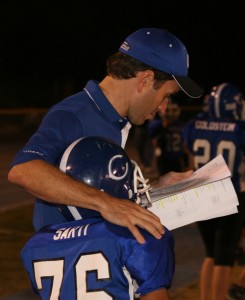 Football season doesn’t feel the same this year. For the first time in 10 years, I’m not coaching. Even though I didn’t do a whole lot of actual coaching last year, I still got to spend Friday nights on the sidelines. There’s a certain atmosphere, an intensity, a feeling of adrenaline you get when you’re among the players. You don’t get that feeling by sitting in the stands. Unfortunately, it was time to hang up the whistle, as I wrote earlier this year.
Football season doesn’t feel the same this year. For the first time in 10 years, I’m not coaching. Even though I didn’t do a whole lot of actual coaching last year, I still got to spend Friday nights on the sidelines. There’s a certain atmosphere, an intensity, a feeling of adrenaline you get when you’re among the players. You don’t get that feeling by sitting in the stands. Unfortunately, it was time to hang up the whistle, as I wrote earlier this year.
By being on the sidelines, I was able to observe things about the game that I never knew before. Here are five things I learned about the game during my ten years coaching it.
- Football obeys the laws of physics
Football is not for small, slow people. If you are small, then you have to be extremely fast to compete at the highest levels. If you are slow, then you had better be big and strong. The best athletes are those who are big, strong and fast. Just look at the numbers at the NFL combine. The players at the top of the draft charts are either ridiculously fast or ridiculously big and strong. The players at the very top are both. - Winning requires preparation
During my first year of coaching, we only watched film of our opponent for one game. It was the only game we won that year. We lost the other seven. After that season, I watched film on every opponent. I used what I saw in the film to develop a practice and game plan for that week. I didn’t win every game, but preparing each week certainly helped me to win more than I lost, including a couple of games we won that we shouldn’t have. It gave me a whole new appreciation of how much work goes into each game behind the scenes. - The game is won in the trenches
My memories of football growing up were of quarterbacks, receivers and running backs scoring touchdowns. I thought all you needed were some good skill players to win games. Little did I know that games were really won and lost based upon the play of your linemen. A strong offensive line can make a mediocre running back or quarterback look great, and a strong defensive line can stymie even the most skilled offensive players and make a defense’s linebackers and secondary look like superstars. Bottom line, a team’s offensive and defensive line will determine how good they really are. Through coaching, I gained a new appreciation of the players in “the pit” which I will always carry with me. - Football is a violent game that requires discipline
Tackle football is a violent sport that requires the highest levels of teamwork and discipline. Like it or not, the top players are not out there just to make plays, they are out there to physically intimidate their opponent. Therefore, players need to be disciplined to do their jobs. A key block can make the difference between a play going for 3 yards or a touchdown. On the other hand, a blown assignment can result in a big loss of yardage or, in the worst case, a player getting hurt. A lack of discipline can also lead to penalties that kill drives for your team, or extends them for the opposition. We spent lots of practice time reviewing and making sure that the kids understood their assignments and the importance of being disciplined about doing their jobs. - Mental strength is just as important as physical strength
Playing the game requires you to be both physically and mentally strong. Throughout the course of a game, things will happen that will test your will, challenge your focus, and have you question your abilities. You have to be able to quickly put past mistakes behind you, avoid thinking ahead, and focus on the moment. Players who are not mentally strong are not able to play at a consistently high level, which limits their potential.
I learned a lot about the game over the ten years I spent coaching it. It completely changed my perspective on the game and how I watch it. I have an appreciation for how much preparation goes into each week’s game plan. I have a better understanding of the strategy and tactics behind the game, and I learned that only elite athletes can compete at the highest levels.

Pingback: It's time to kill the Pro Bowl - Gregg Borodaty